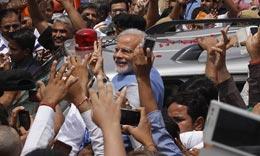B.C. resource sector has great expectations for Modi

British-Columbia’s resource industry, the backbone of the provincial economy, is hailing the Indian election win by opposition leader Narendra Modi and the Bharatiya Janata Party (BJP) as a boon for Canadian business and international trade.
“It is a positive signal for India but he still has to deliver on very high expectations that he can be effective in his promise to deliver long-awaited modernization,” said Stewart Muir, the executive director of the Vancouver-based Resource Works Society.
Muir, in an interview with the South Asian Post said a key test for modernization will be whether India can close the deal on British Columbia liquefied natural gas.
Before the election, Indian leaders had already signed up for Premier Christy Clark’s vision for British Columbia LNG by taking a 10 per cent share in the Pacific Northwest LNG project
“This was a bold step that would increase current Indian LNG imports by nearly 10 per cent,” said Muir.
“Right now, India has a limited range of options to get the massive amount of energy it will need to satisfy the Modi vision for economic growth. Those options at present come down to Russia, the Middle East, and nuclear power – each with its own limitations.
Muir said BC natural gas, shipped out of Prince Rupert, can help Modi start to expand his range of options and strengthen his hand in international relations.
“If Pacific Northwest LNG moves ahead - it is seen as the frontrunner among 13 proposals - this will be a very big deal for India-Canada relations,” said Muir.
Muir said that Modi could be the Indian prime minister who shows the true potential of India’s Diaspora.
“British Columbia, with its 311,000 residents of South Asian descent, is a natural trading bridge between Canada and India. Cultural ties easily lend themselves to stronger economic relationships, especially when the conditions are right as they may be now,” he added.
India has been identified as one of Canada’s 13 priority markets, “where Canadian opportunities and interests have the greatest potential for growth,” according to the Asia Pacific Foundation.
Congratulating India's prime minister-elect over his victory, Canadian Prime Minister Stephen Harper says he is looking forward "to working with Modi and the new government of India to further strengthen our social and economic partnership to the benefit of our citizens."
In an official statement, he commended "550 million Indian citizens who peacefully exercised their right to vote. The unprecedented scale of these elections emphasizes both the vitality and strength of India's democracy." Canada, Harper emphasized, "is proud to share with India the values of freedom, democracy, human rights and the rule of law."
Deepak Obhrai, parliamentary secretary to the foreign minister and for international human rights, congratulated Modi and the BJP on their electoral success. "These elections clearly illustrate that Mr. Modi's message of economic revival resonated with the Indian electorate. Under the leadership of Mr. Modi, India is poised to reach greater heights."
"These elections highlight the maturity and strength of India's democracy and I can say we rejoice with the people of India as they embark on a new direction under the leadership of Mr. Modi," Conservative MP Kyle Seeback said in the House of Commons May 16.
He also referred to Modi's achievements during his term as chief minister of Gujarat: "As Chief Minister of Gujarat, Mr. Modi made it (Gujarat) one of India's best-performing states economically."
Obhrai, an Indo-Canadian, said "our government congratulates Mr. Modi on his win. We look forward to working with Mr. Modi to strengthen the existing social and economic partnership that exists between Canada and India."
"A clear majority for the BJP enables the new government to take measures aimed at boosting growth and investment, removing regulatory bottlenecks and restoring fiscal balance. If implemented, these will restore investor confidence and lead to a resurgence of growth creating new opportunities for Canadian business." said Peter Sutherland, President & CEO of the Canada-India Business Council and former Canadian High Commissioner to India.
Sutherland told the CBC he expects to see a free trade agreement between Canada and India signed by the end of the year now that a business-friendly government is in charge.
Sutherland said free trade talks have been in "a stage of abeyance" while the lengthy election played out. Now that it's over, Sutherland said things could start to move quickly.
"With a BJP government, which is more business oriented, I think they will want to get this thing done, and get it done by the end of the year." he said. "If they put their minds to it, I think they could do it."
Canada and India began formal free trade discussions in 2010.
"Automotive parts is a huge opportunity in India," Sutherland said. "They have a big marketplace, 1.2 billion people, rapidly becoming middle class, starting to buy automobiles for the first time."That creates opportunity for auto parts manufacturers."
Leave a comment









